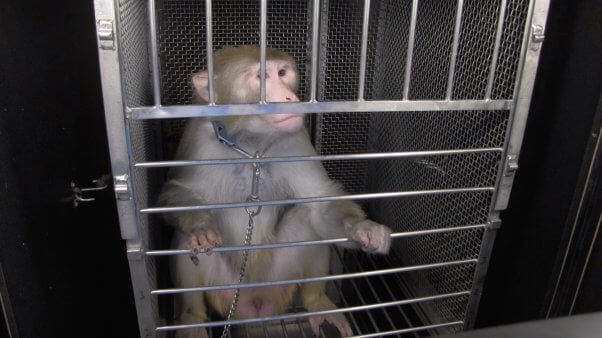PETA’s FOIA Lawsuit Is Successful; NIH Records Reveal Monkeys With Infections, Diarrhea, Chronic Hair Loss
For Immediate Release:
October 7, 2024
Contact:
Tasgola Bruner 202-483-7382
PETA has received the last of the documents on 73 monkeys imprisoned in the National Institute of Mental Health (NIMH) laboratory headed by Elisabeth Murray following the successful resolution of its Freedom of Information Act lawsuit filed in 2021. The veterinary records obtained by PETA paint a picture of ongoing physical and psychological misery for the animals, some of whom have lived alone in cages for more than decade.
Today, PETA sent a letter to Acting NIMH Director Shelli Avenevoli urging her to shut down the laboratory immediately, pointing out that in addition to the suffering endured by the monkeys, the animals are so physically and psychologically damaged that any data from experiments conducted on them would be worthless. NIMH is part of the National Institutes of Health (NIH).
The records reveal that most of the monkeys in Murray’s laboratory have been used again and again in a variety of often invasive experiments, many involving food and water deprivation, and that a number of the animals have suffered from ongoing health issues, including the following:
- To force the monkeys to cooperate in experiments, 64% of them were deprived of water and 48% were deprived of food.
- Metal posts or other devices were surgically implanted in the skulls of 74% of the monkeys, and many of the animals suffered from infections or bleeding as a result.
- Experimenters filed down the teeth of more than half the monkeys.
- 85% of the monkeys suffered from hair loss—a condition associated with extreme psychological distress. One of the monkeys had pulled out nearly all her hair.
- 29% experienced lack of appetite, which can indicate severe depression, and 19% were underweight.
- 64% were overweight, likely stemming from being caged with no opportunity for exercise, exploration, or meaningful stimulation.
- 45% sustained physical injuries, including severed fingertips, puncture wounds, and lacerations that required stitches.
- Nearly 18% of the monkeys suffered from diarrhea or loose stool.
“These monkeys are pitiful reflections of NIH’s callousness,” says PETA Senior Vice President Kathy Guillermo. “They’re sick, thirsty, hairless, injured, and depressed, and any decent human can see that this must not be allowed to continue.”

PETA first released video footage of experiments conducted by Murray in 2020 and has been trying to obtain these records for the past three years. Murray has spent the past 40 years inflicting brain damage on monkeys, frightening them in various ways, restraining them, forcing them to stare at a computer screen for hours at a time, and subjecting them to other torment.
PETA—whose motto reads, in part, that “animals are not ours to experiment on”—points out that Every Animal Is Someone and offers free Empathy Kits for people who need a lesson in kindness. For more information, please visit PETA.org or follow the group on X, Facebook, or Instagram.


